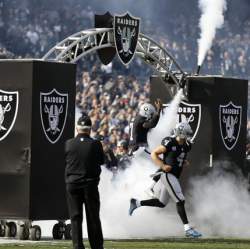NFL Commissioner Roger Goodell indicated he would maintain a hardline stance against sports betting, despite the possibility that an NFL franchise might relocate to Las Vegas soon.
Goodell told Colin Cowherd in an interview last week that relocating a franchise did not signal a shift for the NFL.
Goodell’s statement comes at a time when NBA Commissioner Adam Silver and MLB Commissioner Rob Manfred have said they would be open to reassessing their sport’s stance on gambling. The chances that New Jersey might win a Supreme Court case and strike down the PASPA sports betting law also did not seem to phase Goodell.
Colin Cowherd Interview
When Colin Cowherd asked Goodell about the upcoming vote on the Oakland Raiders’ potential move to Las Vegas, Commissioner Goodell said, “We’ve seen the changes in the culture around the country in gambling. We’re obviously very sensitive to that, but we’re also going to evaluate the Raiders case on the relocation application in what’s in the overall best interests of the league.”
The commissioner sounded a word of warning to those who assume pro football in Las Vegas is a done deal. Goddell added, “But one thing we can’t ever do is compromise on the game. That’s one of the things we’ll do is to make sure the policies we’ve created, if we did in any way approve the Raiders, I don’t see us compromising on any of the policies.”
Las Vegas and Major Sports in the USA
While that is hardly a ringing endorsement of the NFL in Las Vegas, it is a far cry from a generation ago. Even 10 years ago, the consensus opinion was Las Vegas would never be the home to a major pro sports franchise. If a March vote of the NFL ownership goes well, though, then the NFL would join the NHL in relocating a franchise to Sin City.
Traditionally, sports commissioners and the owners they represented did not want a close association with sports betting. They felt even the appearance of a connection would undermine the integrity of the game. The American public had to know that the results were fair and the game were real, so the NFL, NBA, and Major League Baseball took extreme measures to distance themselves from sports gambling.
Traditional Stance towards Sports Betting
That meant punishing athletes who fixed games or bet on their own sport, like Shoeless Joe Jackson and Pete Rose. In 1992, it meant that the leagues lobbied for the Professional and Amateur Sports Protection Act (PASPA), which banned sportsbooks in 46 US states and the District of Columbia. The other four states with sports betting lobbied hard to keep it, so their gaming operations — sportsbooks in Nevada and sports lotteries in Delaware, Montana, and Oregon — were grandfathered into the law.
The point being, the NFL wanted a 50-state ban and took what it could get with PASPA. Since then, American attitudes have changed. As late as 1989, only Nevada and New Jersey had casinos. Tribal casinos now dot the American landscape, which opened the door to the expansion of private-owned casinos and racinos. Lottery gambling has expanded by huge degrees, so now multistate lotteries like Powerball and Mega Millions are offered in 45 states.
Mobile Sportsbooks Changed Everything
Online and mobile sports betting changed attitudes even more. Americans can bet on sports in the privacy of their own homes with their desktop and laptop computers. They can bet on sports with smartphones and tablets anywhere Wi-Fi works. Even though those forms of gambling are banned in the United States, Americans have gotten used to the idea they can gamble on sports at a whim, especially given people’s ability to play daily fantasy sports for real money online.
In the America of 2017, people do not see an NFL franchise in Las Vegas as anything strange. Owners might not have wanted athletes to be in proximity to Las Vegas sportsbooks before, for fear they might gamble themselves. Now, those same athletes could gamble on their smartphone while sitting in the team’s locker room. Excluding Las Vegas from the NFL picture makes little sense anymore.
Roger Goodell’s Real Stance on Sportsbooks
Thus, when the Sheldon Adelson and the taxpayers of Las Vegas agreed to build a $1.7 billion casino, the Oakland Raiders and the NFL ownership had to take the offer seriously. Oakland has all-but-signaled it has no intention to fund such a transformative stadium, so the NFL owners have a decision to make.
In Roger Goodell’s interview with Colin Cowherd, he was staking out a position. He was saying that the NFL was happy to take Nevada’s money to build a stadium, but that was quite separate from the idea NFL owners were supporting legal sportsbooks and an end to the PASPA. Of course, Las Vegas sportsbooks probably agree with Commissioner Goodell, because they would like to maintain their long monopoly of legal sportsbooks in America.

